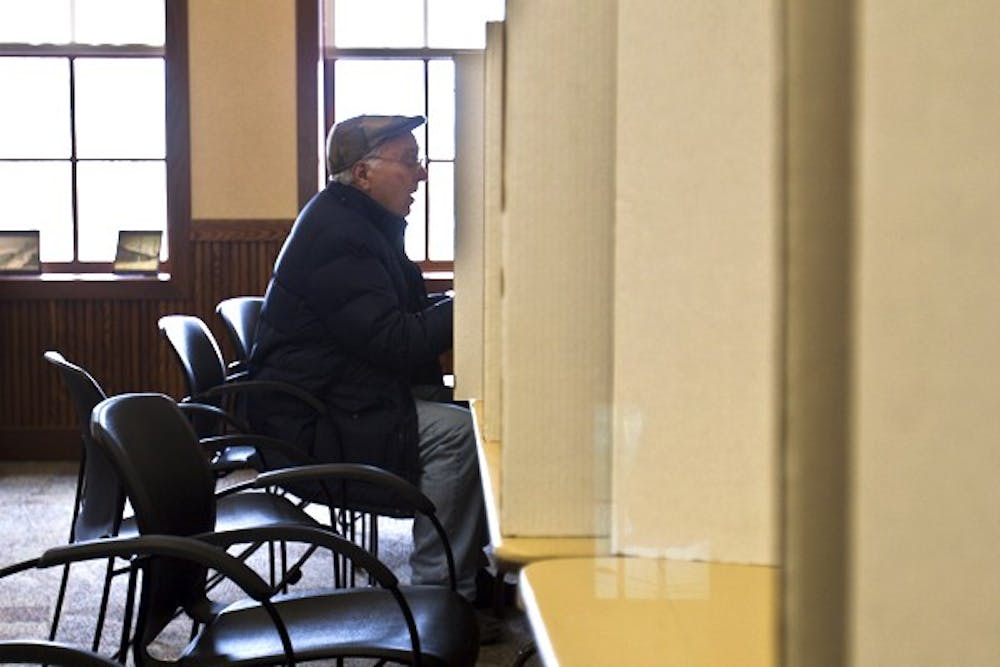UPDATED: Mitt Romney edges out Rick Santorum in close Michigan Republican primary

Mitt Romney won the Michigan Republican primary Tuesday night, avoiding a potentially embarrassing loss in his home state to Rick Santorum.
Romney won with 41 percent of the vote. Santorum finished behind him with 38 percent. With 99.9 percent of the vote counted, Romney had 409,899 votes to Santorum’s 377,521. Texas Rep. Ron Paul and former Speaker of the House Newt Gingrich finished well behind, with 12 percent and 7 percent respectively. Romney and Santorum both won 15 delegates since Michigan's delegates vote proportionally.
A Michigan Republican committee voted Thursday to give Romney the state's two at-large delegates despite the party's rules that those delegates be given on a proportional basis to the statewide vote. Romney and Santorum both receive two delegates from each of the seven districts they won, bringing Romney's delegate count to 16 and Santorum's to 14.
The 28 precincts from Isabella County reported Santorum as the winner for the county with 40.5 percent to Romney’s 37.7 percent.
Romney also won the Arizona Republican primary and all of its 29 delegates.
The former Massachusetts governor won a close contest between himself and Santorum. Romney has struggled to connect with Tea Party supporters and evangelicals across the state and has been negatively impacted by his opposition to the 2009 bailouts of General Motors and Chrysler.
“It was very important for Mitt Romney to win the Michigan primary,” said Political Science Professor and Chairperson Orlando J. Perez in an email. “Romney has the money and organization to go forward and Santorum lacks money and organization to com- pete in all of the states left to vote. Winning Michigan and Arizona provides Romney some momentum going into next week’s Super Tuesday where 10 states will hold their primaries.”
Much was made of the impact Democrats would have on the primary heading into Tuesday. Democratic leaders had urged Democrats to go to the polls to vote for Santorum. Santorum’s campaign put out robocalls appealing to Democratic-leaning voters to vote for the former senator to send a message to Romney for his opposition to the auto bailouts.
Central Michigan University Griffin Endowed Chair Maxine Berman said the impact of Democratic participation in the Republican primary is slightly overplayed.
“Apparently about 10 percent of voters were Democrats, at least according to some early exit polls,” Berman said. “The last (Republican primary in 2008), it was 7 percent, so it’s not that big of an effect. But in a close race, could that make a difference? Sure.”
A CNN exit poll indicated 9 percent of primary voters identified as Democrats.
Berman saw parallels between the 1972 Democratic presidential race and the 2012 Republican presidential race relating to party crossovers.
“George Wallace, who was a well-known racist, won the Democratic primary in (1972),” Berman said. “Democrats accused Republicans of crossing over to make us (the Democratic Party) look bad. There was a little bit of that, but if you look at the numbers, it really wasn’t that big of an impact.”
Looking forward to the general election, the fight between the Republican front-runners appears to have damaged the Republican brand in the state. Once considered a tossup state, President Barack Obama now appears to have locked the state up. An NBC News/Marist poll from earlier this month found Obama opening up an 18 point advantage over Romney and a 26 point lead over Santorum.
“Polls show that a majority of people in Michigan support the bailout of the auto industry and that should provide a big boost to Obama,” Perez said. “This will be a difficult state for a Republican to win.”
This story has been updated for accuracy.



